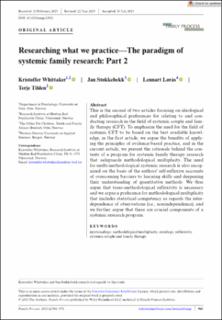Researching what we practice—The paradigm of systemic family research: Part 2
Peer reviewed, Journal article
Published version
Permanent lenke
https://hdl.handle.net/11250/3110515Utgivelsesdato
2023Metadata
Vis full innførselSamlinger
- Import fra CRIStin [3604]
- Institutt for velferd og deltaking [1018]
Sammendrag
This is the second of two articles focusing on ideological and philosophical preferences for relating to and conducting research in the field of systemic couple and family therapy (CFT). To emphasize the need for the field of systemic CFT to be based on the best available knowledge, in the first article, we argue the benefits of applying the principles of evidence-based practice, and in the current article, we present the rationale behind the contents of a program for systemic family therapy research that safeguards methodological multiplicity. The need for multi-methodological systemic research is also recognized on the basis of the authors' self-reflexive accounts of overcoming barriers to learning skills and deepening their understanding of quantitative methods. We thus argue that trans-methodological reflexivity is necessary and we argue a preference for methodological multiplicity that includes statistical competency as regards the interdependence of observations (i.e., nonindependence), and we further argue that these are crucial components of a systemic research program.

